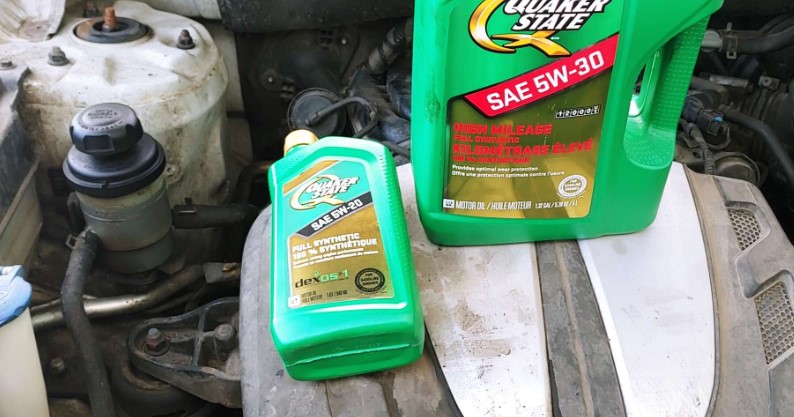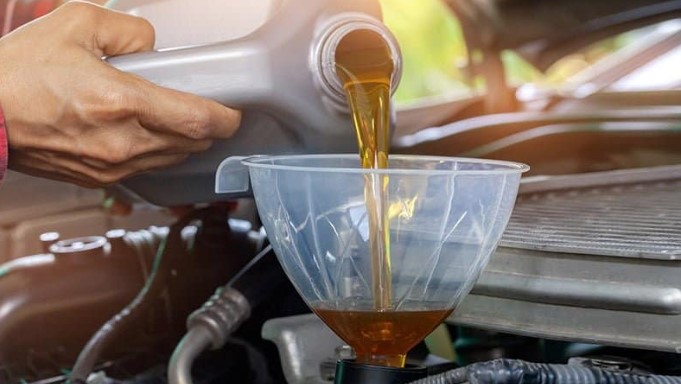Your vehicle’s engine oil is the most vital thing to help you run your vehicle smoothly. However, sometimes, the weather, road condition, or the type of oil you use in your vehicle can be the thing that prevents it from happening. That is why some people would go as far as mixing different types of engine oils to ensure better riding and improve mileage. But the question is, can you mix 5w20 and 5w30 engine oil?
Yes, you can change your vehicle’s performance by mixing both 5w20 and 5w30. But, you must know that these are two different types of oil and should be mixed carefully. The oils needs to be from the same brand and weight or viscosity for effectiveness. However, though the mixed oil does not cause any serious damage to the vehicle, experts still suggest not using mixed oil.
Different people have different opinions regarding mixing 5w20 and 5w30 engine oil. But why? What makes these two types of oil different, or what is the best way to mix them?
Wanna find out more? Then I urge you to read the rest of this article.
Can You Mix 5w20 And 5w30?
Most people think they can just mix 5w20 and 5w30 oil and be done with it. But that’s not how it works. Since almost all kinds of oils have different viscosity, mixing them will not do the job all the time. But can people really mix 5w20 and 5w30 engine oil?
Well, yes! Many people mix these two types of oil to achieve better mileage. And the 5w20 and 5w30 oils having different viscosity do not really cause any serious damage to the vehicle, as much as we know.
Also, you must mix these oils only if you are sure that you will drive your car in optimal condition and the weather’s temperature is normal. Because it is not a good idea to use the mixed oil at a temperature that is too hot or too cold for it. Why?
First of all, the 5w20 oil is thinner, and you should use only 5w20 oil if the temperature is below 32°F. And because of the quality, the oil goes to the engine more smoothly, even in cold weather.
On the other hand, the 5w30 oil is thick, which makes it more appropriate for hot weather. Even if the temperature is over 102°F, this oil can still go through easily. And since oil’s property changes at lower temperatures, using the 5w30 oil will not be an issue in summer. But it can be if you are using a 5w20 oil. Learn from this forum discussion.
What Are The Differences Between 5w20 And 5w30 Engine Oil?
The fluidity of the oils is what makes them different from one another. While one of them is relatively thin or lightweight, the other one is heavy or thick.

The 5w20 oil is thin, which is why it is more suitable for cold temperatures, as thin oil flows easily to the engine at a low temperature. On the other hand, the 5w30 oil is thick and works better for higher temperatures. It will not do a good job at low temperatures.
But that’s not all. We must also look into the letter and numbers the oil contains to find other significant differences and understand how they work if you intend to mix them.
Meaning Of “W”
Both oils have the letter “w,” which stands for winter. The number before this letter indicates the oil’s behavior at a lower temperature. The engine oil’s property changes with the change in temperature. While some become thicker, others just turn more fluid.
And then there is the number before the letter. The lower number it contains, the better the oil performs at a cold temperature.
Meaning Of The Numbers
And then there are the numbers after the letter w. Both oils have the numbers 20 and 30 after the letter. The number indicates how the oils react when at a higher temperature or the viscosity of the oil.
A 5w20 oil means it will perform well in a 212°F temperature. And a 5w30 oil can withstand a higher temperature than that.
So if you consider everything I mentioned above, the main difference between the 5w20 and 5w30 oils is their ability to perform in high or low temperatures. The ability of 5w20 oil to perform well in cold weather makes it more fuel efficient. With this oil, you can kick-start your vehicle very easily.
On the other hand, 5w30 oil will perform slightly differently. Since this oil is thicker, it does not change much in cold weather conditions, and it is comparatively less fuel efficient. That is why it is more suitable for summer or warmer weather.
Here is the difference between 5w20 and 5w30 oil at a glance.
| Oil Type | 5w20 | 5w30 |
|---|---|---|
| Viscosity | Lightweight | Heavy |
| Fuel Economy | Efficient | Less efficient |
| Cold Temperature Performance | Better | Good |
| Wear/Tear Protection | Good | Better |
| Suitable Temperature | Low/Cold | High/Warm |
Is It Safe To Mix 5w20 And 5w30 Oil?
Now, let’s find out the answer to the most important question. Will it be safe for your vehicle if you mix 5w20 and 5w30 oil?
All engine oil manufacturing companies have separate standards when it comes to manufacturing oil. As a result, different oil brands offer different oil quality.
However, there is a standard for engine oil for all types of cars. So manufacturers make oil based on that standard. Still, there is still a difference in their oil’s viscosity.
The reason I’m explaining all these is because when it comes to mixing two types of oils, you must keep in mind a thing or two. So here is what you need to know if you want to ensure safe oil mixing for your car.

Use Oil Made For Your Vehicle
The first thing you need to do to ensure your vehicle remains safe and performs well with mixed oils is to use oils that are compatible with your vehicle. That’s right! Not all vehicle engine oil will work for all cars. So when picking the 5w20 and 5w30 engine oils, you need to be sure they are made for your vehicle type.
Same Brand Oil
The second most important thing to do is to choose oils from the same brand. As I have explained already, all brands use different properties for oil manufacturing, and that is why oils from different brands tend to have different viscosity. So when you choose oils from the same brand, even if they have a slightly different viscosity.
But what can you do if you do not have the right oil to mix?
Well, sometimes, you might run out of one type of oil. And it can force you to choose a different type of oil from a different brand. Will that be safe?
As far as I can tell, there is no risk of having any major issues. But your car will not work in the same way as it would with the right oils. The problems you may face can be the vehicle not kick-starting right away or not running smoothly in hot or cold weather.
What Are The Ratios Of Mixing 5w20 And 5w30?
Mixing two different oils might not have a hard and fast rule. However, you still need to ensure you are mixing them in an accurate ratio to get the best outcome.
If you are mixing 5w20 and 5w30 engine oil, you can go with a larger portion of the thicker oil and a smaller portion of the thinner oil. So since the 5w20 oil is thin and the 5w30 oil is thick, you can mix them in a 1:2 ratio.
But remember that all vehicles are different and require different types of engine oils. If your vehicle comes with specific instructions for oil, you must keep a larger proportion of that when mixing with a different oil.
For example, if your vehicle is used to or uses 5w20 oil, you need to add 2 parts of the 5w20 oil and 1 part of 5w30 oil or vice versa. Or, you can just check your vehicle’s user manual to check if there are any specific instructions regarding it.
What Happens If You Accidentally Use 5w30 Oil Instead Of 5w20?
If you mix 5w20 oil with 5w30 oil, it will not be a big issue. However, you may often face a few things because of what oil you usually use in your car and what you accidentally use. Let me explain!
Suppose you live in a cold weather area and use 5w20 oil regularly. It means your vehicle is used to running on that oil too. But what happens if you accidentally use 5w30 oil and mix it with 5w20 oil?
Honestly, it will not cause anything scary. There is a chance that your vehicle will still operate just fine as long as you use oils from the same brand. It will still offer excellent protection in colder weather.
Moreover, adding 5w30 oil will make it easier for you to drive around in warmer places. And despite the hot weather, your engine will still get adequate lubrication and run smoothly.
Pros And Cons Of Using 5w20 And 5w30 Mixed Oil
The reason there are debates regarding the oil mix is that different users have different experiences with it. But in the end, there are always good and bad outcomes for everything. And the same goes for 5w20 and 5w30 mixed oils. But what are their pros and cons?
Pros
- Adequate Lubrication: It is not always possible, but you might often find 5w20 and 5w30 oil of the same viscosity. And when you mix two such oils of the same viscosity, they will provide adequate lubrication when the engine is activated.
- Safe Use: As said in the previous section, when mixing oils of the same viscosity would make the vehicle operate smoothly. And it also means the vehicle engine will operate safely.
- Cost Effective: Another perk of using mixed oil is that it is comparatively cost-effective. Because instead of buying larger oil containers, you can just mix two different oils from the same brand.
- Reduces Wear And Tear: When you mix the oil accurately, and it works for your vehicle, it helps the vehicle in other ways as well. With the engine running smoothly, it will prevent fast wear and tear, which is also part of the vehicle’s improved performance.
Cons
- Potential Risk: Here is where things get complicated. If you fail to mix the right oil and maintain the right ratio, it will not work. In fact, while the risks are not so threatening, they can still cause minor damages and wear and tear to car parts.
Things To Consider When Mixing 5w20 And 5w30 Oil
As you have guessed already, you cannot mix different types of oil just like that. There are still a thing or two you must consider before that. The two most important things you need to remember when mixing 5w20 and 5w30 are the oil brands and API, and here is why.
Brand
All brands have their own separate formula for oil. So when you get oil from two different brands, it is unlikely that you will get the exact same oil. That is why it is highly recommended to avoid mixing oils from different brands and choose the same brand’s oils only. Because if the oils have separate viscosity, they will never blend and will not look good when you use them in your vehicle engine.
API (American Petroleum Institute Level)
Mix the wrong oil with different APIs, and you end up making an explosive. But don’t worry. It is not as bad as it sounds. The good thing is most vehicles come with a recommended API standard. As a result, finding engine oil with similar API has become less challenging. You will find synthetic, semi-synthetic, and even mineral oil with such standard API levels, making it easier to mix different oils.
5w20 Or 5w30? Which One Offer Better Mileage?
Car owners have always been cautious when it comes to picking engine oils because everyone wants the best result. So when it comes to 5w20 and 5w3o engine oil, which are both equally better, it is hard to decide which one to choose when it comes to getting better mileage.
Now, the answer to this question once again depends on your vehicle’s standard oil type and the temperature you live in. If higher mileage is your ultimate goal, you should go with a thicker oil consistency, which is the 5w30 oil.

When you give the engine thicker oil, the oil will run better and offer adequate lubrication, something thinner oils often fail to do. Besides, thinner oil often causes oil leakage, which is also bad for your vehicle.
So, what kind of thick oil should you use for better mileage?
Well, while some users would not go for synthetic oil, it has been found that this type of oil is more effective in getting better mileage than regular oil. Synthetic oil contains natural gas, which helps it burn better and ultimately ensures better mileage.
Frequently Asked Questions
Q. Is it ok to put 5w30 in a 5w20 oil?
In most cases, experts recommend not putting 5w30 oil in 5w20 oil because of their difference in viscosity. If not mixed accurately, they can become a potential threat to your vehicle engine.
Q. Is 5w20 oil thin?
The 5w20 oil becomes relatively thin at a higher temperature. However, it can still offer maximum protection when in a normal temperature.
Q. Is 5w30 oil good for summer?
Yes, the 5w30 oil is good for summer because the heat or higher temperatures cannot thin out the oil easily.
Q. Will the wrong oil mix damage my vehicle engine?
If you are using the wrong oil or mixing oils that don’t go together, there is a big chance that the engine will be affected badly by it. And even if the damage is not very severe, it can still make the engine more prone to wear and tear.
Conclusion
Many vehicle experts would not recommend mixing different kinds of engine oil because it might not always be the brightest idea. But can you mix 5w20 and 5w30 oil?
Yes, you certainly can. But the oils must meet the conditions I have mentioned throughout the articles. And that is: the oil must be of the same brand and API level. Though having the same viscosity is not an issue, you can try maintaining it if possible.
And to know if the mixed oil is working on your vehicle, you can add a small amount of mixed oil first to see if it works. If the vehicle does not seem to have any problem with it, you can go with the process. However, if it looks like your vehicle is having starting issues or not running smoothly, it is best to avoid using mixed engine oil.
